
Oxford University professor Doyne Farmer traces his research exposing risks in the financial system to the roulette wheels of Las Vegas.
In the 1970s, Farmer and two fellow physics students at the University of California at Santa Cruz built a computer small enough to hide in a shoe that helped them predict roughly where roulette balls would land. At casinos in Vegas, they communicated with toe-controlled switches and transmitters, also in their shoes, about what bets to make. The gadget was legal, but they feared their winnings—about a 20% return on their wagers—would lead to trouble. So they quit after a couple of years.
“We were nervous about getting our kneecaps broken,” he explains.
Today, in a more bucolic setting—the Institute for New Economic Thinking at the Oxford Martin School—Farmer is drawing on decades of complexity research that began with roulette. After winning acclaim as a pioneer of chaos theory, which helps explain the unpredictability of complex systems such as the weather, he jumped into markets, co-founding one of the early quantitative investment firms in the 1990s. Now, Farmer and a band of central bank researchers are focusing on the tangled web of global finance, using a tool of the natural sciences called agent-based models to find dangers lurking in the system and uncover ways to avoid them.
Agent-based models, used in fields from biology to sociology, are bottom-up, simulating the messy interactions of hundreds and even millions of agents—human cells or attitudes or financial firms—to explain the behavior of a complex system. The nonlinear interplay can produce unexpected phenomena, such as economic booms and busts, providing insights into the causes of events and the best responses. Epidemiologists have successfully deployed the models for years to test strategies to control everything from obesity to the spread of infectious diseases, including the flu.
هذه القصة مأخوذة من طبعة October - November 2019 من Bloomberg Markets.
ابدأ النسخة التجريبية المجانية من Magzter GOLD لمدة 7 أيام للوصول إلى آلاف القصص المتميزة المنسقة وأكثر من 9,000 مجلة وصحيفة.
بالفعل مشترك ? تسجيل الدخول
هذه القصة مأخوذة من طبعة October - November 2019 من Bloomberg Markets.
ابدأ النسخة التجريبية المجانية من Magzter GOLD لمدة 7 أيام للوصول إلى آلاف القصص المتميزة المنسقة وأكثر من 9,000 مجلة وصحيفة.
بالفعل مشترك? تسجيل الدخول
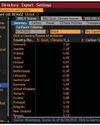
See Which Countries Are Falling Behind On Climate Change
Under the Paris Agreement, 190 countries and the European Union pledged to take steps to hold the global temperature rise to less than 2C (3.6F) from preindustrial levels—and preferably 1.5C.
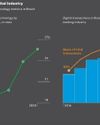
Billionaires Vie for the Future of Brazilian Finance
An escalating battle between two billionaires is upending the financial community in São Paulo, Latin America’s wealthiest city.
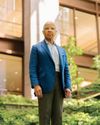
Ford Foundation's Darren Walker: ‘We Have to Get Uncomfortable'
DARREN WALKER, 62, disrupted his Wall Street life more than 25 years ago when he left what is now UBS Group AG to volunteer at a school and eventually pursue a career in community development and philanthropy. Since 2013 he’s been at the pinnacle of the philanthropic world as president of the Ford Foundation, created by the family of automaker Henry Ford during the Great Depression to advance human welfare.

Fueling the Ener Transition
I MAY BE BIASED, but some of the most important research and data on the Bloomberg terminal lies in one of its lesser-known functions: {BNEF }
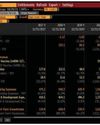
Dig Into Analysts' Estimates for Disruptive Companies
THE PANDEMIC ERA generated a whole wave of disruptive companies as it accelerated the introduction of new products and services in areas including artificial intelligence, digitization, electronic payments, online meeting platforms, and virtual currencies.
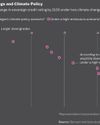
Climate Risks Come for Sovereign Credit
FOR YEARS climate scientists have warned about the ferocious wildfires and hurricanes that are now overwhelming many communities. Today alarms are ringing about a related financial danger: risks lurking within government bonds, the biggest part of the global debt market.
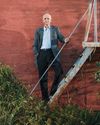
Responsible-Investing Pioneer Lydenberg Says ESG Needs An Upgrade
STEVE LYDENBERG’S passion for social change was inspired by anti-Vietnam War demonstrations, consumer boycotts, and the movement to divest from apartheid South Africa. But he didn’t take to the streets. Instead, Lydenberg turned to the world of finance to help catalyze societal change.

Engine No. 1's Grancio: ‘People Will Appreciate an Economic Argument'
ENGINE NO. 1 sent shock waves across corporate America in May when the fledgling investment firm won a boardroom battle with Exxon Mobil Corp., securing three seats on the oil and gas giant’s board after purchasing only about $40 million of its stock.
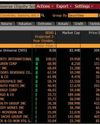
Find Out Which Companies May Ramp Up Payouts After Covid
AS THE PANDEMIC DISRUPTED business last year, many companies cut or suspended dividends. Which will boost their payouts when economies pick up again?
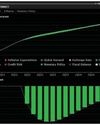
Get Into the Minds of Central Bankers as They Navigate Shocks
HAVE YOU EVER WONDERED how central bankers forecast the impact of shocks on the economy?